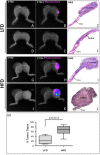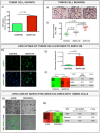Bone marrow adipocytes promote tumor growth in bone via FABP4-dependent mechanisms
- PMID: 24240026
- PMCID: PMC3875773
- DOI: 10.18632/oncotarget.1482
Bone marrow adipocytes promote tumor growth in bone via FABP4-dependent mechanisms
Abstract
Incidence of skeletal metastases and death from prostate cancer greatly increases with age and obesity, conditions which increase marrow adiposity. Bone marrow adipocytes are metabolically active components of bone metastatic niche that modulate the function of neighboring cells; yet the mechanisms of their involvement in tumor behavior in bone have not been explored. In this study, using experimental models of intraosseous tumor growth and diet-induced obesity, we demonstrate the promoting effects of marrow fat on growth and progression of skeletal prostate tumors. We reveal that exposure to lipids supplied by marrow adipocytes induces expression of lipid chaperone FABP4, pro-inflammatory interleukin IL-1β, and oxidative stress protein HMOX-1 in metastatic tumor cells and stimulates their growth and invasiveness. We show that FABP4 is highly overexpressed in prostate skeletal tumors from obese mice and in bone metastasis samples from prostate cancer patients. In addition, we provide results suggestive of bi-directional interaction between FABP4 and PPARγ pathways that may be driving aggressive tumor cell behavior in bone. Together, our data provide evidence for functional relationship between bone marrow adiposity and metastatic prostate cancers and unravel the FABP4/IL-1β axis as a potential therapeutic target for this presently incurable disease.
Conflict of interest statement
The authors disclose no potential conflicts of interest
Figures








References
-
- Bassett WW, Cooperberg MR, Sadetsky N, Silva S, DuChane J, Pasta DJ, Chan JM, Anast JW, Carroll PR, Kane CJ. Impact of obesity on prostate cancer recurrence after radical prostatectomy: data from CaPSURE. Urology. 2005;66(5):1060–1065. - PubMed
-
- Freedland SJ, Banez LL, Sun LL, Fitzsimons NJ, Moul JW. Obese men have higher-grade and larger tumors: an analysis of the duke prostate center database. Prostate cancer and prostatic diseases. 2009;12(3):259–263. - PubMed
-
- Gong Z, Neuhouser ML, Goodman PJ, Albanes D, Chi C, Hsing AW, Lippman SM, Platz EA, Pollak MN, Thompson IM, Kristal AR. Obesity, diabetes, and risk of prostate cancer: results from the prostate cancer prevention trial. Cancer Epidemiol Biomarkers Prev. 2006;15(10):1977–1983. - PubMed
-
- Scosyrev E, Messing EM, Mohile S, Golijanin D, Wu G. Prostate cancer in the elderly: frequency of advanced disease at presentation and disease-specific mortality. Cancer. 2012;118(12):3062–3070. - PubMed
-
- Keto CJ, Aronson WJ, Terris MK, Presti JC, Kane CJ, Amling CL, Freedland SJ. Obesity is associated with castration-resistant disease and metastasis in men treated with androgen deprivation therapy after radical prostatectomy: results from the SEARCH database. BJU Int. 2012;110(4):492–498. - PMC - PubMed
Publication types
MeSH terms
Substances
Grants and funding
LinkOut - more resources
Full Text Sources
Other Literature Sources
Medical
Research Materials

